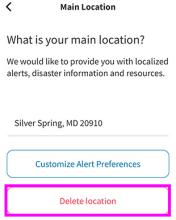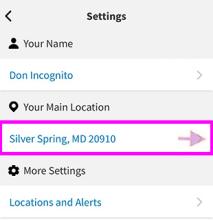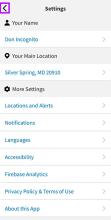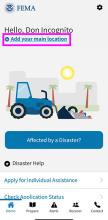FEMA Media Library
Main Locations screen. Back arrow in top left, “Save” button, and “Close” button at bottom highlighted.
Alert Settings screen. “Delete location” button highlighted.
Alert Settings screen. Block with “Des Moines, IA 50307” highlighted.
Settings screen. “Locations and Alerts” field arrow highlighted.
“Settings” screen. Back arrow at top left highlighted
The LSCMS-C User Request form is used for individuals of a TSP who require an LSCMS-C account to access the Carrier Document Upload and/or Web Tenders role within LSCMS-C. The LSMCS-C user request form submittal begins the onboarding process for a newly applying TSP.
Recovery Support Function Leadership Group financial data - May 31, 2025
App opening screen. “Add a location” is highlighted.









